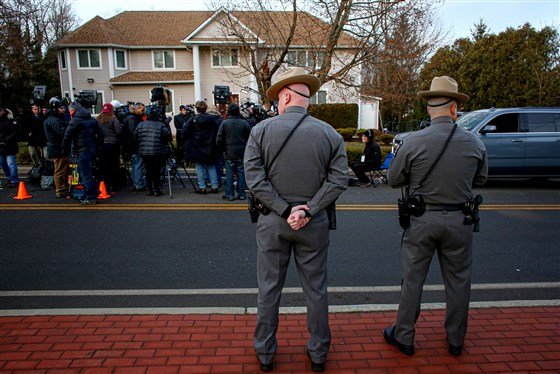 Police officers stand guard as the press gathers outside the home of a rabbi where a machete attack injured five people during a Hanukkah gathering in Monsey, N.Y., on Dec. 29, 2019. (Kena Betancur / AFP – Getty Images)
Police officers stand guard as the press gathers outside the home of a rabbi where a machete attack injured five people during a Hanukkah gathering in Monsey, N.Y., on Dec. 29, 2019. (Kena Betancur / AFP – Getty Images) Saturday night, at a Hanukkah party in Los Angeles, I heard about an antisemitic attack in New York, in which a suspect wielding either a knife or machete – depending on which news source you read – broke into a Hasidic home and stabbed several of the occupants, who were lighting the Hanukkiyah (Hanukkah menorah) at the time. It happened in Monsey, a Hasidic enclave in Rockland County, New York. I was immediately transported back to my childhood and my many visits to that town, where my grandparents lived as observant Conservative Jews, a minority group within the larger Hasidic Jewish population.
Driving into the hamlet of Monsey, my mother always pointed out the disappearance of the TV antennae from the rooftop, a visible rejection of some of the trappings of American materialism and the connection to secular society. They had no TVs in these households, we were told, and we gazed out the window with incredulity at those rooftops and at the Jews who walked the streets in full Hasidic garb, at this community that, while also Jewish, was so different from the way we “did Jewish.” This was a place with Hasidic-run groceries and businesses, and even the ShopRite in Route 59 had been impacted by the density of the religious population: its massive aisles boasted an impressive array of kosher products.
While the TV antennae visual probably doesn’t resonate any more because the internet provides all kinds of access to forbidden images, I remember the effect of all these sights: these Jews lived in a world apart from American society, as much as was possible, protected from profanity and lewdness and secular influence, as stringently Jewish and religiously observant as the citizens wanted to be. That circle of protection was shattered with this antisemitic incident.
But it doesn’t matter where this attack happened. Hate doesn’t adhere to geographical boundaries, or religious ones either – while writing this piece, I received news of three people being shot in a church near Fort Worth, Texas, and across the pond, antisemitic graffiti in Hampstead and Belsize Park in London. So this isn’t a Monsey problem, or even a New York problem. It’s a global society problem. So how are we, as a global society made up of local provinces, preparing to combat hate, racism and intolerance of the “other”?
To say that I am saddened by these latest attacks, and by all the attacks that preceded it, is a gross understatement that stymies me as a writer. How can I explain, in a word or phrase or hot take, how disheartened I am by the unchecked rise of intolerance, racism and hate that leads people to attack those who they perceive as “other”? How can I unpack how confused I am about the path ahead, wondering if the extreme love and light we champion as salve for the deep wounds inflicted by extremist hate and darkness are powerful enough to make a difference. Responding to the Monsey stabbing, New York State Governor Andrew Cuomo called the hatred “an American cancer on the body politic.” If we’re in that metaphor, where is the chemo or radiation to kill these life-threatening cells and neutralize this illness?
I don’t have a foolproof solution, resplendent with strategies, appeals to lawmakers and law enforcement, or plans for community outreach and education. The task seems enormous, too systemically ingrained to make a difference. But the one approach that seems to make sense to me right now is drawn from an emotional parallel to how we may be approaching climate change: we all have to do our part, every day, even if it seems small and insignificant. We must bring light–to illuminate, to highlight justice. Just because the work is great and we may not be able to finish it ourselves doesn’t exempt us from doing our part.
So, for tonight, it’s okay to feel the pain, and take refuge in the dark, illuminated by the flickering lights of the Hanukkiyyah, that seem to signal both life’s hope and instability within the same flames. Because if there’s anything we learn from Hanukkah, it’s that small efforts can triumph in seemingly impossible battles, and that a single vial of oil, a single unit of energy, potential and illumination, can generate light beyond its perceived capacity. May the same be true of our efforts to combat antisemitism and intolerance. As we light tonight, with the Hanukkiyyah finally complete, we will hold the victims of this week’s antisemitic attacks in our hearts, as we do whenever violence renders us raw. And after this night of extreme candlelight, we will think about all the ways we can move forward. Tomorrow, we will be the light.























 More news and opinions than at a Shabbat dinner, right in your inbox.
More news and opinions than at a Shabbat dinner, right in your inbox.